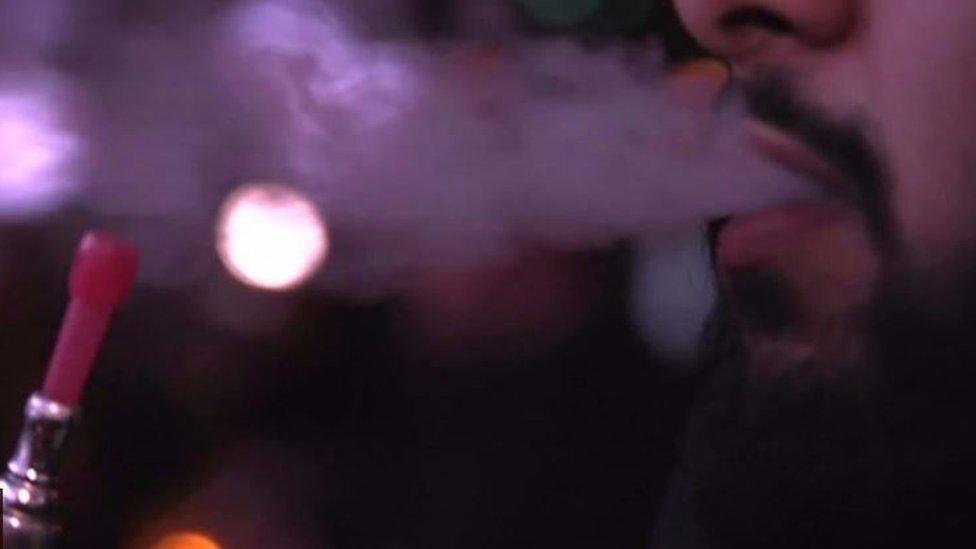Will regulation help shisha lounge fears disappear in puff of smoke?
- Published

Could regulation help shisha lounge concerns disappear in a puff of smoke?
Booming business
Shisha lounges are increasingly commonplace signs of our diverse, multicultural society. But they can also make life a misery for nearby residents, according to the Labour MP for Birmingham Ladywood, Shabana Mahmood.
Venues are springing up fast, with more than three dozen at the last count around her home city alone. They're also appearing around other towns and cities in the Midlands.
They have arrived here from the Middle East and elsewhere in Asia where they are long-established as communal meeting places. People gather to smoke a pipe known as a hookah or galyan. Traditionally they would have used tobacco, or even opium. Here in Britain, herbal ingredients are smoked in designated areas which must be no more than 50% enclosed.
It's becoming increasingly popular among all sections of the community, especially young people. Smokers usually range between 18 and 55 years old but most are in their 20s.
Shabana Mahmood tells me that "properly located, they can be good places for people to meet and relax". But she says when lounges open up in residential areas, they can make local people's lives a misery, especially when they become what she calls "hotspots for anti-social behaviour".
According to Shabana Mahmood, some lounges can be antisocial behaviour 'hotspots'
Last summer, Birmingham City Council revoked the licences of two shisha lounges. In one case, a passer-by was injured when a bullet ricocheted outside a premises. And in the other, there had been a string of incidents in which laughing gas had been sold to children.
But the letter of the law applies only to the sale of alcohol, late night refreshments and music. There's no specific licensing provision for shisha. Ms Mahmood sees this as a gap in the legislation which makes it difficult for the police and councils to clamp down.
Could this be another example where outdated legislation needs to be brought up to date?
Ms Mahmood certainly thinks so. The present rules are "totally inadequate", she says, calling for "a more effective regulatory regime". She wants the government to introduce a much tougher system of statutory licensing.
Public order or public health?
Ms Mahmood has secured a debate at Westminster this week to concentrate attention on public order and not on any health dimensions.
She is supported in this by the Labour West Midlands Police and Crime Commissioner, David Jamieson, who told the 大象传媒: "The police work robustly on licensing issues. There doesn't need to be a blanket ban on shisha lounges, but they should face the same rigorous licensing conditions as other premises."
But if the government were to re-examine the licensing arrangements, health would inevitably figure in the ensuing debate.
Are shisha smokers deluding themselves as to health risks?
The British Heart Foundation (BHF) says many shisha smokers delude themselves that it is less dangerous than smoking cigarettes. The smoke, according to the BHF, contains toxins which put users just as much, if not more, at risk of heart disease and cancer as tobacco smokers.
Not surprisingly, the proprietors of shisha lounges do not take this advice at face value.
Our political reporter Rob Mayor will be hearing all sides of the story this week and you can find out what he uncovers in this weekend's Sunday Politics Midlands.
We'll also be joined in the studio by the Conservative MP for West Worcestershire and Foreign Office minister Harriett Baldwin, and the Labour MP for Stoke-on-Trent North, Ruth Smeeth. For the record, we know of at least 10 shisha lounges in and around her constituency.
And I hope you will join us too, at 11:00 GMT on 大象传媒 One on Sunday 9 December.